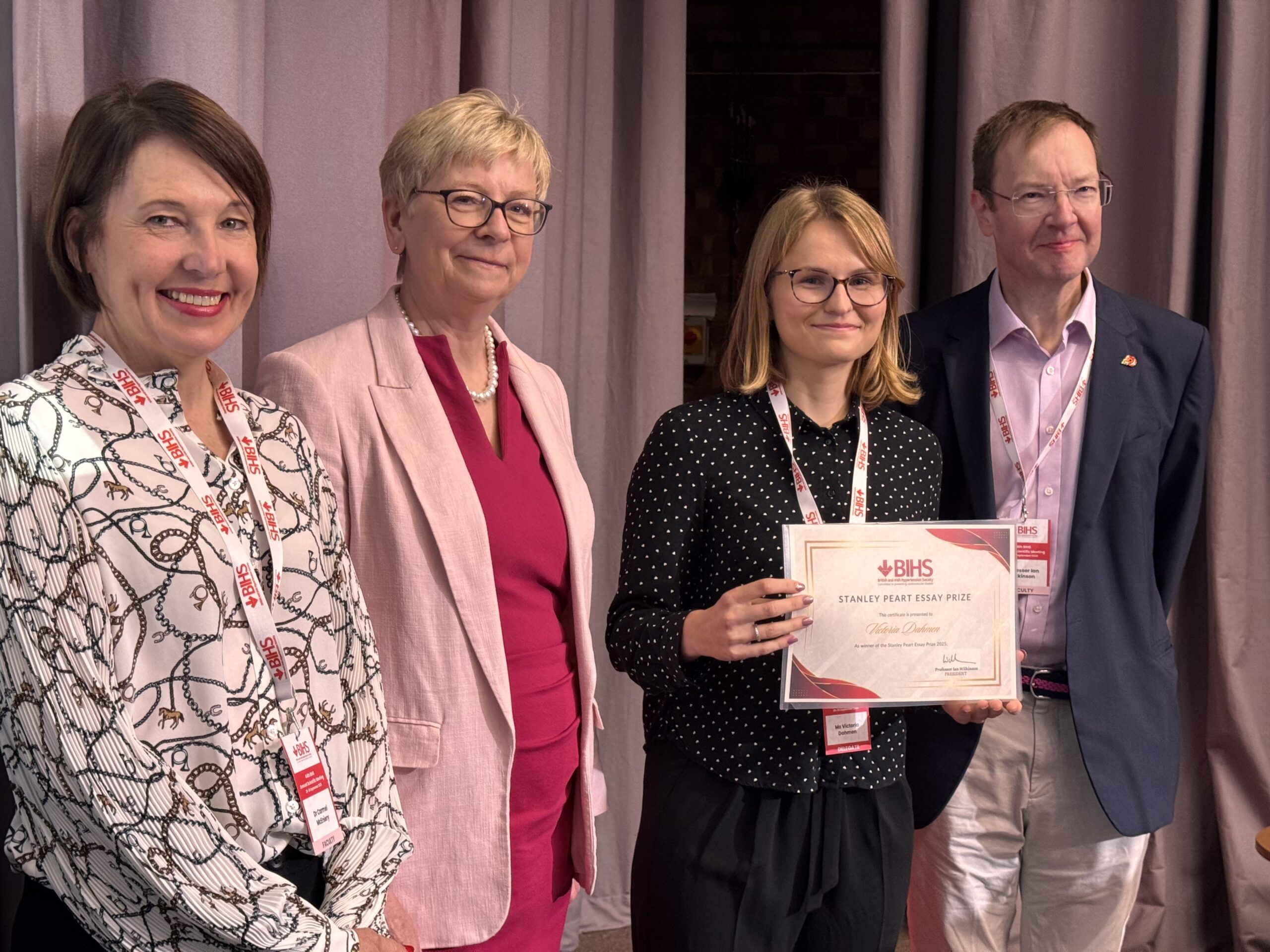Victoria Dahmen has won the acclaimed Stanley Peart Essay Prize from the British and Irish Hypertension Society (BIHS), with the third-year Medical Student triumphing over competitors, including senior medical registrars with years of clinical experience, to claim this national recognition.
The Stanley Peart Essay Prize honours Sir Stanley Peart, the pioneering cardiovascular researcher who made fundamental contributions to understanding blood pressure regulation. The prestigious £1,000 prize, funded by The Foundation for Circulatory Health, attracts entries from early career researchers across Britain and Ireland.
“I can’t emphasise enough how impressive this is – a third-year undergraduate winning a national competition in which some very experienced and senior Specialist Registrars competed,” said her supervisor, Dr Carmel McEniery from Cambridge’s Department of Medicine.
Rethinking Medical Terminology
Victoria’s prize-winning essay addressed the provocative question: “Is Essential Hypertension really Primary or Essential?” Her essay argues that current medical terminology inadvertently discourages patients from seeking life-saving treatment – a problem that could affect millions of people with high blood pressure.
In her essay, Victoria argued that the term “essential hypertension” creates dangerous misconceptions. “The vast majority of hypertensives – around 85% – have what we call primary hypertension,” she explains. “We know about the vast array of factors that contribute to high blood pressure, from diet and stress to genetics and lifestyle. Yet the medical community still calls it ‘essential,’ as if it’s necessary or inevitable. Her analysis highlights the real-world consequences of this seemingly academic distinction. “The term ‘essential hypertension’ almost suggests that it can’t be treated,” Victoria argues. “Hypertension is measurable, preventable and treatable, yet so many people follow the hypertensive trajectory without any intervention .”
This terminology issue is particularly significant given that hypertension affects millions of people across the UK – with around one in three adults having high blood pressure – and is a leading cause of heart attacks, strokes, and premature death when left untreated. What stands out in Victoria’s essay is her ability to connect academic study with practical patient care – a perspective she believes was enhanced by her experience at Churchill College.
The origin of an interest
Victoria’s journey to this achievement began in her first year at Churchill, when Dr McEniery’s supervisions on cardiovascular physiology sparked her curiosity about blood pressure regulation. “She was excellent at explaining blood pressure regulation and is actively involved in hypertension research,” Victoria recalls.This initial interest deepened through a first-year summer internship where hypertension was discussed in a professional laboratory context, followed by pharmacology modules in her third year that further explored cardiovascular treatments. Each step built her understanding of hypertension and current approaches to treatment.
Churchill College’s environment has also shaped her perspective on health and prevention. The college’s exceptional sports facilities – including an on-site gym, sports fields, and squash courts available free to all students – have given her firsthand insight into prevention strategies.
“Living among these facilities just naturally sparks an interest in health and prevention,” Victoria reflects. Her involvement in Churchill College Boat Club has provided personal experience of rowing’s cardiovascular benefits, reinforcing her understanding of exercise as a key prevention strategy.
The ‘Silent Killer’ Problem
Victoria’s essay emphasizes the importance of early intervention, particularly relevant given hypertension’s reputation as a “silent killer” due to its lack of early symptoms.
“A major concern is that most people don’t discover they have high blood pressure until their 50s or 60s,” she warns her fellow students. “But research shows people are already on the pathway of developing hypertension from their late teens onwards, and the arterial changes are mostly irreversible.”
“In the remaining 15% of hypertensives, a specific cause has been identified – a kidney-, hormone-, or blood vessel–related condition. Sadly, it is easy to misclassify patients into the “essential” bracket, especially if they share the predisposing factors for primary hypertension. This may result in patients missing out on effective, targeted treatment strategies, she argues in her essay.
Her essay examines how current medical labels may be hindering patients from seeking help at earlier stages, and doctors from facilitating an intervention, focusing on the real-world impact of academic terminology.
Recognition and Future Plans
Victoria presented her essay at the BIHS annual conference, coincidentally being held at Churchill College this year, where she received her award alongside distinguished researchers from across Britain and Ireland.
Looking ahead, Victoria has secured a place on Cambridge’s highly competitive MB/PhD programme, positioning her to spend the next six years developing both clinical skills and research expertise.
Her achievement demonstrates exceptional analytical thinking and communication skills that will serve her well as she progresses from essay writing to conducting original research and eventually treating patients—where her awareness of how medical language affects patient behaviour will be a valuable asset in clinical practice.
Image (left to right) Dr Carmel McEniery, Prof. Sharon Peacock (Master of Churchill College), Victoria Dahmen and Prof. Ian Wilkinson (Chair of the British and Irish Hypertension Society)

